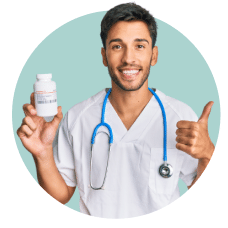Rivaalarm 3mg Tablet
Product introduction
Your doctor will explain how to take Rivaalarm 3mg Tablet. Follow the instructions carefully to get the most benefit. The dose may change from time to time to suit your individual needs. You may take it with food, preferably at night before going to bed. It can take up to a few weeks for symptoms to improve so keep taking your medicine regularly. You should not stop taking this medicine without consulting your doctor.
Some common side effects of this medicine include nausea, vomiting, weight loss, indigestion, and weakness. You may have side effects more often when you start your treatment or when your dose is increased. Usually, the side effects will slowly go away as your body gets used to the Rivaalarm 3mg Tablet. If they are severe or will not go away, you should contact your doctor.
Before using Rivaalarm 3mg Tablet, you should tell your doctor if you’ve ever had heart problems, stomach ulcers, epilepsy, or asthma. It may also affect, or be affected by, some other drugs you are using so let your doctor know what these are to be safe. During pregnancy, this medicine should only be taken if it is advised.
Uses of Rivaalarm Tablet
Benefits of Rivaalarm Tablet
In Treatment of Dementia Associated with Parkinson's disease
Side effects of Rivaalarm Tablet
Common side effects of Rivaalarm
- Loss of appetite
- Nausea
- Vomiting
- Indigestion
How to use Rivaalarm Tablet
How Rivaalarm Tablet works
Safety advice
However, inform your doctor if you have underlying kidney diseases as close monitoring is advised while you are taking this medicine.
However, inform your doctor if you have an underlying liver disease as close monitoring is advised while you are taking this medicine.
What if you forget to take Rivaalarm Tablet?
All substitutes
Quick tips
- You have been prescribed Rivaalarm 3mg Tablet to slow down the progression of Alzheimer's disease.
- It does not cure Alzheimer's disease but may help improve brain function and ability to do daily activities.
- It may cause diarrhea, nausea, and vomiting. Drink plenty of fluids to keep yourself hydrated while taking Rivaalarm 3mg Tablet.
- Do not drive or do anything that requires mental focus until you know how Rivaalarm 3mg Tablet affects you.
- Be cautious while taking this medicine if you suffer from peptic ulcer as it may cause vomiting, stomach bleeding, stomach pain, or discomfort.
- Inform your doctor if you experience seizures or convulsions while taking this medicine.
- You have been prescribed Rivaalarm 3mg Tablet to slow down the progression of Alzheimer's disease.
- It does not cure Alzheimer's disease but may help improve brain function and ability to do daily activities.
- It may cause diarrhea, nausea, and vomiting. Drink plenty of fluids to keep yourself hydrated while taking Rivaalarm 3mg Tablet.
- Do not drive or do anything that requires mental focus until you know how Rivaalarm 3mg Tablet affects you.
- Be cautious while taking this medicine if you suffer from peptic ulcer as it may cause vomiting, stomach bleeding, stomach pain, or discomfort.
- Inform your doctor if you experience seizures or convulsions while taking this medicine.
Fact Box
Interaction with drugs
Patient concerns
FAQs
How long does Rivaalarm 3mg Tablet take to work?
How should Rivaalarm 3mg Tablet be taken?
Is it okay to take antacids while taking Rivaalarm 3mg Tablet?
What will happen if I take more than the recommended doses of Rivaalarm 3mg Tablet?
Does Rivaalarm 3mg Tablet cause drowsiness?
Can I stop taking Rivaalarm 3mg Tablet?
Can Rivaalarm 3mg Tablet cause hallucinations?
How long does Rivaalarm 3mg Tablet take to work?
How should Rivaalarm 3mg Tablet be taken?
Is it okay to take antacids while taking Rivaalarm 3mg Tablet?
What will happen if I take more than the recommended doses of Rivaalarm 3mg Tablet?
Does Rivaalarm 3mg Tablet cause drowsiness?
Can I stop taking Rivaalarm 3mg Tablet?
Can Rivaalarm 3mg Tablet cause hallucinations?
Related ayurvedic ingredients
Disclaimer:
Tata 1mg's sole intention is to ensure that its consumers get information that is expert-reviewed, accurate and trustworthy. However, the information contained herein should NOT be used as a substitute for the advice of a qualified physician. The information provided here is for informational purposes only. This may not cover everything about particular health conditions, lab tests, medicines, all possible side effects, drug interactions, warnings, alerts, etc. Please consult your doctor and discuss all your queries related to any disease or medicine. We intend to support, not replace, the doctor-patient relationship.References
- Stahl SM, editor. Rivastigmine. In: Stahl's Essential Pschopharmacology: Prescriber's Guide. 5th ed. New York, New York: Cambridge University Press; 2014. pp. 603-607.
- Katzung BG. Special Aspects of Geriatric Pharmacology. In: Katzung BG, Masters SB, Trevor AJ, editors. Basic and Clinical Pharmacology. 11th ed. New Delhi, India: Tata McGraw Hill Education Private Limited; 2009. p. 1041.
- Briggs GG, Freeman RK, editors. A Reference Guide to Fetal and Neonatal Risk: Drugs in Pregnancy and Lactation. 10th ed. Philadelphia, PA: Wolters Kluwer Health; 2015. p. 1229.
Marketer details
The list of available options shown with the same composition has been prepared upon the advice of registered medical practitioners, pharmacists affiliated with TATA 1MG. TATA 1MG does not promote any pharmaceutical product of any particular company, and all recommendations are based on the medical opinion, advisories from specialist medical and pharmaceutical professionals.
Lab tests offered by us















